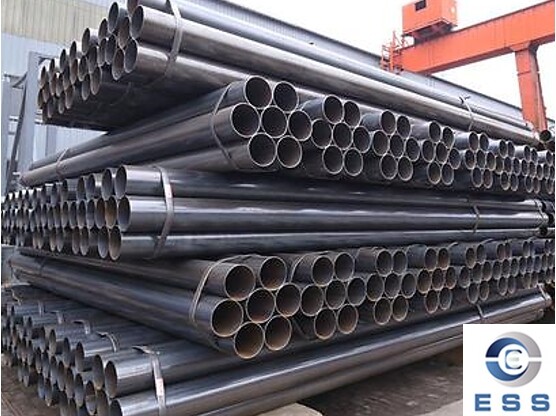
MS pipe is a carbon
steel pipe with a carbon content between 0.05% and 0.25%. Welding is an
important means of connecting MS pipes, and choosing suitable welding
rods is the core element to ensure welding quality. The characteristics of
welding rods directly affect the strength, toughness, corrosion resistance and
other properties of the weld, which in turn determines whether the welded MS pipe can operate stably and reliably in practical applications. The
following rods can be used to weld MS pipes:
MS pipe welding rods
E4303 welding rods
1. Characteristics
It is a titanium calcium type welding rod
and is one of the most commonly used low carbon steel welding rods. This
welding rod has good welding process performance, stable arc, small spatter,
easy slag removal, and beautiful weld formation. It can be welded in all
positions, that is, it can obtain good welding quality in flat welding,
vertical welding, horizontal welding and overhead welding positions.
2. Scope of application
It is widely used for welding MS pipes such as Q235, and is often used for welding steel pipes in general
industrial pipelines and building structures, such as water pipes, heating
pipes, etc.
E5015 welding rod
1. Characteristics
It is a low-hydrogen sodium type welding
rod, and the weld metal has good mechanical properties, especially in terms of
toughness and crack resistance. However, this welding rod has high requirements
for welding process, such as the need to use a DC reverse power supply, and
must be dried strictly in accordance with the requirements before use, because
the moisture in the welding rod coating will cause hydrogen pores in the weld.
2. Scope of application
It is suitable for MS pipe structures with high welding requirements, such as pipes that withstand a
certain pressure, steel pipes that require low-temperature toughness, etc. For
example, outdoor pipelines in some northern regions may be affected by
low-temperature environments. Using E5015 welding rods helps to ensure the
performance of the weld at low temperatures.
Solid welding wire
ER50-6 welding wire
1. Characteristics
This is a commonly used solid welding wire
for carbon dioxide gas shielded welding. Its chemical composition ratio is
reasonable, so that the weld metal has good strength and toughness. Under the
protection of carbon dioxide gas, the welding process is stable, the spatter is
relatively small, and the welding wire has high deposition efficiency, which
can increase the welding speed.
2. Scope of application
It is widely used in the welding of MS pipes, especially suitable for automated welding production lines. For
example, in the automobile manufacturing industry, it is used for welding MS pipes in automobile exhaust systems, or for batch welding of mild steel
tubes in machining workshops.
Flux-cored welding wire
E501T-1 welding wire
1. Characteristics
Flux-cored welding wire has some advantages
of both electrodes and solid welding wires. The flux core of E501T-1 welding
wire contains a variety of alloying elements and slag-forming agents, which can
form protective slag during welding and protect the weld. It has good welding
process performance, can be used for all-position welding, and produces
relatively less smoke during welding.
2. Scope of application
It is suitable for welding MS pipes
with high requirements for appearance quality, such as welding of some
decorative steel pipe structures or welding of indoor pipelines with good
requirements for welding environment. At the same time, it is also commonly
used for welding MS pipes with complex on-site installation conditions.
Summary
When welding MS pipes, it is
necessary to comprehensively consider welding process requirements, welding
environment, cost and other factors, and accurately select the most suitable
welding rods to ensure welding quality and ensure the safe and stable operation
of MS pipes in various application scenarios.
Read more: MS Pipe Welding Procedure or MS Pipe Chemical Composition













 Eastern Steel Manufacturing Co.,Ltd not only improve product production and sales services, but also provide additional value-added services. As long as you need, we can complete your specific needs together.
Eastern Steel Manufacturing Co.,Ltd not only improve product production and sales services, but also provide additional value-added services. As long as you need, we can complete your specific needs together.










